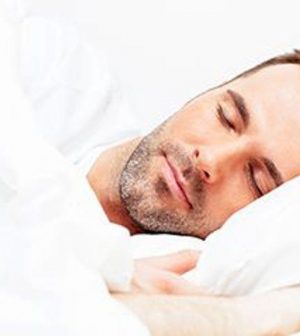- Could Your Grocery Store Meat Be Causing Recurring UTIs?
- Are You Making This Expensive Thermostat Error This Winter?
- Recognizing the Signs of Hypothyroidism
- 10 Strategies to Overcome Insomnia
- Could Artificial Sweeteners Be Aging the Brain Faster?
- Techniques for Soothing Your Nervous System
- Does the Water in Your House Smell Funny? Here’s Why
- Can a Daily Dose of Apple Cider Vinegar Actually Aid Weight Loss?
- 6 Health Beverages That Can Actually Spike Your Blood Sugar
- Treatment Options for Social Anxiety Disorder
Does It Matter What You Eat or Drink Before Bed?

If you suddenly find yourself craving food or drink right before you head to bed, one expert suggests you steer clear of big meals and caffeine.
“From a sleep standpoint, you shouldn’t eat a big meal at 8 p.m. if you plan to go to bed at 9 p.m. If you are sensitive to caffeine, I would say to stop drinking it around noon,” said Roberta Anding, a registered dietitian and assistant professor in the Joseph Barnhart Department of Orthopedic Surgery at Baylor College of Medicine in Houston.
“Drinking caffeine before bed will impact your sleep. The average person takes about 10 to 20 minutes to fall asleep,” she said in a Baylor news release. “If you have caffeine in your system or are sensitive to it, this amount of time can double.”
And watch out for hidden sources of caffeine: “Caffeine is not only found in coffee, tea and some soft drinks but can also be added to the pre-workout drink you take before going to the gym,” Anding said.
Similar warnings apply to eating heavy meals late at night.
Anding explained that consuming a big meal before bed will impact blood flow and alter sleep/wake cycles.
“Having a lot of food in your stomach before bed can redirect blood flow to your gut to digest the food, meaning there is less blood flow going to your brain. You need that blood flow to your brain to make sure you go into the different sleep stages,” Anding explained.
Still, if you work the night shift, your eating and drinking schedule will differ from those who work a day job.
So, if you need to eat something before going to sleep, Anding says the best option is to eat something light and easy to digest.
“A bowl of berries, Greek yogurt or even a sliced apple with some peanut butter,” she said. “It needs to be something high in protein or high in fat that is going to stay in your stomach longer. Quality also matters. Many of the foods people eat before bedtime are traditional snack foods such as chips or ice cream.”
As for what is good to drink at night, you don’t have to stick with water: Anding suggests drinking milk or even sparkling water without caffeine.
“A lot of the reasons people drink coffee or tea are because they relish in the flavor,” Anding said. “If coffee or tea is something a person just needs to have before bed, think about switching to a decaffeinated version, which would be a better option. Although decaffeinated isn’t always 100 percent caffeine-free, there is significantly less caffeine.”
More information
The Sleep Foundation has more on eating before bed.
SOURCE: Baylor College of Medicine, news release, May 14, 2024
Source: HealthDay
Copyright © 2026 HealthDay. All rights reserved.










